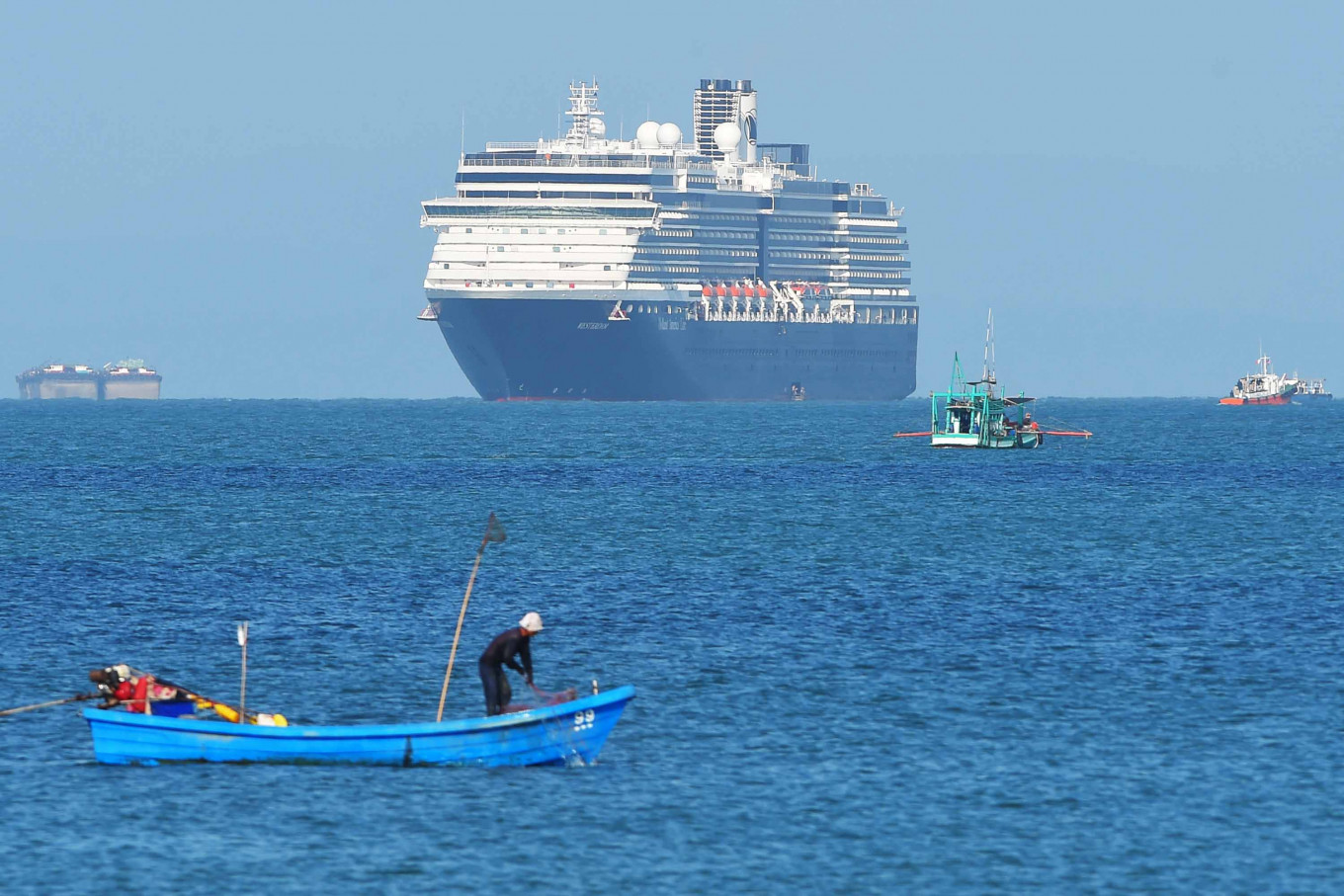Popular Reads
Top Results
Can't find what you're looking for?
View all search resultsPopular Reads
Top Results
Can't find what you're looking for?
View all search resultsCOVID-19: Crew members return to Indonesia as cruise liners halt global operations
Hundreds of Indonesians returning home from work aboard international cruise ships will be allowed entry but they need to obey strict health protocols upon arrival in Indonesia.
Change text size
Gift Premium Articles
to Anyone
N
early a thousand Indonesians working aboard international cruise liners have returned, as the COVID-19 pandemic has forced their employers to suspend all operations and send them home.
As of Wednesday, at least 963 Indonesian seafarers and crew members had arrived in the country, Foreign Ministry officials confirmed, after traveling on commercial and charter flights funded by their companies.
“At a time when the COVID-19 outbreak has evolved into a pandemic, cruise ship operators have faced major disruptions to their activities. Most have decided to halt their operations and send their crew back,” said Judha Nugraha, the ministry’s director for overseas citizen protection, in a virtual press conference held on Wednesday.
According to the ministry’s records, there are an estimated 12,748 Indonesian crew members working aboard 89 cruise ships around the world – operated by a total of 10 big companies.
A string of virus cases has been connected with numerous cruise ships around the world, sending governments scrambling to keep the COVID-19 outbreak at bay.
Although most ships did not see a substantial spread of the disease, a few – including the Diamond Princess, World Dream, MS Westerdam and MS Zaandam – have seen the virus spread quickly amongst passengers and crew, which includes Indonesians.
According to analysis issued by the International Rescue Committee on Wednesday, COVID-19 transmission on the Diamond Princess, where 712 passengers contracted the virus during a two-month quarantine in Yokohama, Japan, occurred four times faster than at the peak of the outbreak in China’s Wuhan province, where the virus was first detected.
Under the patronage of the operators, crew members are often the last people to disembark a ship and have had to be quarantined the longest.
However, the pandemic has not stopped some crew members from staying behind.
“Not all of them are returning to Indonesia. Some have chosen to continue to work on board [their ships],” Judha said, adding that the ministry would take all the necessary steps to ensure their wellbeing.
The Indonesian government is in constant contact with authorities and cruise operators to ensure that its seafarers are all in good health, and, if some are found to have contracted the virus, that they would be cared for in accordance with standard health protocols.
Read also: Indonesia to offer exemptions from temporary ban on foreigners
Acting ministry spokesperson Teuku Faizasyah reiterated that cruise companies had an obligation to fulfill the rights of their crew members, including in funding their safe passage home when an emergency situation arises.
“We can’t predict the future, but we want to underline that, based on previous experiences, [the crew] are supposed to get their jobs back when conditions improve,” Faizasyah said during the teleconference.
Judha added that some cruise directors had reassured the government that they would not terminate their workers’ contracts and would even continue paying them if they chose to return to Indonesia.
At a time when the government in Jakarta is scrambling to contain the pandemic, the return of hundreds of seafarers from abroad has raised eyebrows and left some segments of the population feeling concerned. Indonesia had recorded 1,677 confirmed cases of COVID-19 with 157 deaths and 103 recoveries as of Thursday morning.
Officials have urged most Indonesian travelers to return home before travel restrictions come into effect, and have asked those in more permanent living situations to stay put overseas so that they avoid unnecessarily “importing” viral infections and the steep costs of repatriation that come with it.
However, the Foreign Ministry has said that it cannot lawfully prevent people from returning home. Law No. 16/2011 on immigration stipulates that the government cannot forbid Indonesian citizens from returning to their homeland. “We understand that, in the midst of this pandemic, we need to implement certain health protocols,” Judha said.
Read also: Indonesian cruise crew arrives in Bali from virus-hit Italy, tests negative for COVID-19
For virus-stricken cruise ships, the ministry implemented a protocol similar to the one used on the Grand Princess cruise ship that docked in San Francisco Bay, the United States, after days of being stranded at sea with 21 confirmed infections on board.
“We ask the cruise ship to impose a quarantine on board [...] According to the [World Health Organization], virus-positive crew should not be allowed to go home and should be treated in nearby hospitals,” the official said.
The cruise ship’s quarantine period ends Saturday.
As for those who have arrived safely in Indonesia, they must undergo all the necessary health protocols at their respective ports of entry, whether at airports, ports and border gates, where the authorities will take their temperatures, screen them for symptoms and conduct rapid testing.
Those who test positive for the virus will be quarantined at their port of entry, while those who test negative will be allowed to self-quarantine for two weeks at home.
“So for Indonesians who have chosen to go home, we will facilitate their needs but they must obey protocol so that they do not spread the virus in the country,” Judha said.










